Journalism Awards
The Nieman Foundation honors exceptional journalism in six categories each year, recognizing reporting that reflects meticulous investigations, careful fact checking, masterful storytelling and balanced coverage of complex and sometimes contentious topics.
Worth Bingham Prize for Investigative Journalism
Established in 1967, the annual $20,000 Worth Bingham Prize honors investigative reporting of stories of national significance where the public interest is being ill-served.
2016 Winner
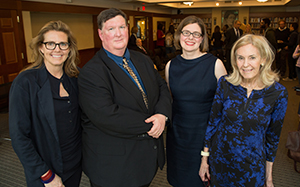
Members of the Bingham family with the 2016 Bingham Prize winners. From left, Clara Bingham, Michael J. Berens, Patricia Callahan and Joan Bingham
The Chicago Tribune for its three-part series “Suffering in Secret.” The result of a yearlong investigation into the abuse and neglect of adults with disabilities in Illinois, the series by reporters Michael J. Berens and Patricia Callahan has led to important reforms to remedy wrongdoing and provide new protections for victims inside Illinois’ taxpayer-funded group homes and their day programs.
 The Worth Bingham Prize for Investigative Journalism celebrated its 50th anniversary in 2017. Many of the best investigative reporters in the U.S. have won the prize since the award was established in 1967. To mark the occasion, a panel of former winners—including Michael Rezendes from The Boston Globe, Dana Priest from The Washington Post and Audra Burch from The Miami Herald, who now works for The New York Times—joined one of this year’s winners, Michael J. Berens from the Chicago Tribune, to discuss the impact and importance of investigative reporting.
The Worth Bingham Prize for Investigative Journalism celebrated its 50th anniversary in 2017. Many of the best investigative reporters in the U.S. have won the prize since the award was established in 1967. To mark the occasion, a panel of former winners—including Michael Rezendes from The Boston Globe, Dana Priest from The Washington Post and Audra Burch from The Miami Herald, who now works for The New York Times—joined one of this year’s winners, Michael J. Berens from the Chicago Tribune, to discuss the impact and importance of investigative reporting.
During the past five decades, winning entries have uncovered abuse, neglect, corruption and malfeasance of all types at the local, state and national level. Many of the reports have led to important policy and legislative changes that have corrected wrongdoing. In a number of instances, reporters have given voice to the voiceless and in doing so, have helped protect some of society’s most vulnerable citizens.
Read a message from Worth Bingham’s daughter, author and journalist Clara Bingham.
Taylor Family Award for Fairness in Journalism
The Taylor Award for Fairness in Journalism honors balanced and impartial news coverage by American journalists and news organizations. Members of the Taylor family, who published The Boston Globe from 1872 to 1999, established the $10,000 award in 2001. Finalists receive $1,000 each.
2016 Winner
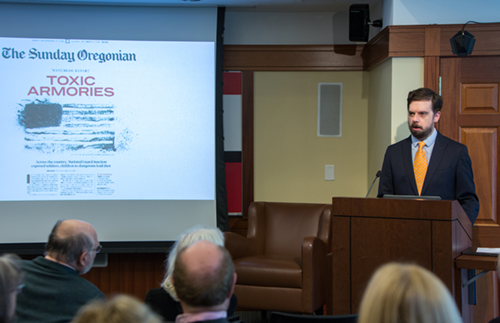
The Oregonian's Rob Davis, winner of the 2016 Taylor Family Award for Fairness in Journalism
The Oregonian/OregonLive and reporter Rob Davis for “Toxic Armories.” The series was the result of an extensive 18-month investigation during which Davis discovered that hundreds of National Guard armories across the United States had been contaminated by dangerous amounts of lead dust from indoor gun ranges. Soon after the series was published, the National Guard closed every toxic armory to community groups who used the space for public events and celebrations and promised federal money to pay for the cleanup. The reporting also led to new rounds of lead testing by the military and lawmakers called for access to inspection reports. Oregon’s governor demanded that inspection records be posted in armories and online, and the state’s entire congressional delegation called for oversight hearings in Washington.
Finalists
“Busted,” a ProPublica series that revealed that tens of thousands of people are sent to jail each year based on the results of unreliable field drug tests. The reporting resulted in a number of exonerations for wrongful convictions; led manufacturers of the drug test kits to issue warnings about their usefulness; and raised questions among lawyers and others in the legal system on the continued use of the drug tests for convictions.
“Every Other Breath,” a multimedia examination of the impact of climate change and the science behind global warming by The Post and Courier’s projects reporter Tony Bartelme, a 2011 Nieman Fellow. Bartelme examined the impact of global climate change, beginning with the effects on plankton, the microbes and creatures responsible for half of the oxygen we breathe. Bartelme helped readers better understand the science behind environmental changes, looking at rising sea levels, coral reef destruction and the abundance of carbon dioxide in the air along the way.
- Read the press release
- Watch a video of the award presentation
The Louis Lyons Award for Conscience and Integrity in Journalism
The Louis M. Lyons Award for Conscience and Integrity in Journalism recognizes the work of courageous journalists and journalism organizations around the world. Nieman Fellows in the class of 1964 established the award to honor the Nieman curator who retired that year.
2018 Winner
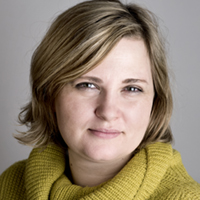
Elena Milashina
Elena Milashina for her groundbreaking and persistent investigative reporting on human rights abuses in Russia while enduring threats from powerful figures. She was also chosen as a representative of independent Russian journalists who continue to work in the face of hostility and persecution from the nation’s leaders, agencies and their associates.
Milashina is a veteran investigative reporter for Novaya Gazeta, the most prominent of Russia’s independent newspapers. She is best known for stories in 2017 in which she and a colleague reported that hundreds of gay men had been detained and tortured by officials in Chechnya as part of an anti-homosexual purge, and some were even killed by order of the authorities. Officials and religious leaders in Chechnya made death threats against Milashina and her colleagues. In recent years, six journalists from Novaya Gazeta have been murdered.
In selecting her for the award, Nieman Fellows in the class of 2018 said “Elena Milashina reminds us why we became journalists. Her work and her persistence are important and inspirational at a time when reporters are being attacked by governments around the world, from the United States to Turkey to China. Milashina and her colleagues hold the powerful to account, and they do it despite the very real threats of death, imprisonment and public scorn.”
2017 Winner
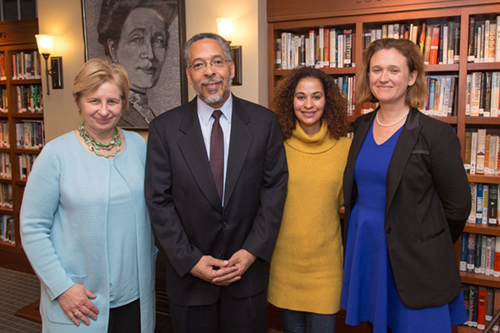
2017 Lyons Award winner Lewis W. Diuguid with Nieman Foundation Curator Ann Marie Lipinski, left, and 2017 Nieman Fellows Jeneé Osterheldt and Katherine Goldstein
Lewis W. Diuguid, in recognition of his commitment to excellence in journalism and his work as a newsroom leader and role model for young journalists. During his nearly 40-year career as a reporter, editor, columnist and editorial board member at The Kansas City Star, Diuguid distinguished himself as a relentless advocate for newsroom diversity. He tirelessly used his voice to draw attention to societal inequities, write about civil rights and highlight systemic injustices.
Following the Lyons Award presentation in February, Diuguid spent time at Harvard as a Knight Visiting Nieman Fellow. While on campus, he pursued his passion for fostering diversity and equity and explored how early childhood education might be used as a catalyst to encourage children to become lifelong newspaper readers, thereby helping them to engage more deeply in their communities.
J. Anthony Lukas Prize Project Awards
Established in 1998, the Lukas Prize Project honors the best in American nonfiction writing. Co-administered by the Columbia University Graduate School of Journalism and the Nieman Foundation, the project is sponsored by the family of the late Mark Lynton, a historian and senior executive at the firm Hunter Douglas in the Netherlands.
The J. Anthony Lukas Book Prize ($10,000)
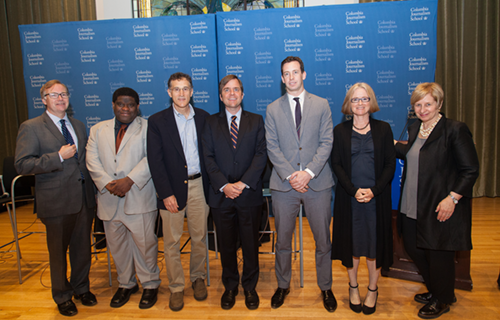
From left, Steve Coll, dean of the Columbia Graduate School of Journalism; 2017 Lukas Prize Project winners Gary Younge, Tyler Anbinder and Christopher Leonard; finalists Zachary Roth and Helen Thorpe; and Nieman curator Ann Marie Lipinski
Winner: Gary Younge for “Another Day in the Death of America: A Chronicle of Ten Short Lives”
Finalist: Zachary Roth for “The Great Suppression: Voting Rights, Corporate Cash, and the Conservative Assault on Democracy”
The Mark Lynton History Prize ($10,000)
Winner: Tyler Anbinder for “City of Dreams: The 400-Year Epic History of Immigrant New York”
Finalist: Adam Hochschild for “Spain in Our Hearts: Americans in the Spanish Civil War, 1936-1939”
The J. Anthony Lukas Work-in-Progress Award ($25,000)
Winner: Christopher Leonard for “Kochland.”
Finalist: Helen Thorpe for “The Newcomers”
Joe Alex Morris Jr. Lecture
The Morris Lecture is presented annually by an American overseas correspondent or commentator on foreign affairs who is invited to Harvard to discuss international reporting.
2017 Winner

American photojournalist Lynsey Addario will present the Joe Alex Morris Jr. Lecture on Jan. 18, 2018. Addario regularly works for The New York Times, National Geographic and Time magazine and over the past 15 years, has covered every major conflict and humanitarian crises of her generation, including Afghanistan, Iraq, Darfur, Libya, Syria, Lebanon, South Sudan, Somalia, and Congo. Her New York Times best-selling memoir, “It’s What I Do,” chronicles her personal and professional life as a photojournalist coming of age in the post-9/11 world. Addario has been the recipient of numerous international awards. In 2015, American Photo Magazine named her one of the five most influential photographers of the past 25 years and in 2009, Addario was awarded a prestigious MacArthur Fellowship. She also was part of the New York Times team to win the 2009 Pulitzer Prize for International Reporting for her photographs in “Talibanistan,” published in the New York Times Magazine.
I.F. Stone Medal for Journalistic Independence
Established in 2008, the I.F. Stone Medal recognizes journalistic independence and honors the life of investigative journalist I.F. Stone. The award is presented annually to a journalist whose work captures the spirit of independence, integrity and courage that characterized I.F. Stone’s Weekly, published from 1953 to 1971.
2017 Winner
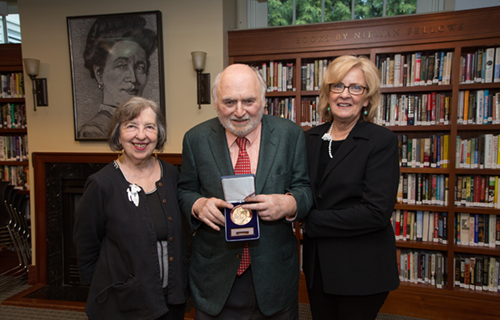
2017 I.F. Stone Medal recipient Victor S. Navasky with Celia Gilbert, left, and Florence Graves
Journalist and author Victor S. Navasky, in recognition of his career dedicated to journalistic integrity and for his work speaking truth to power beyond the confines of mainstream media. Navasky has served as editor, publisher and now publisher emeritus of The Nation, which remains the oldest continually published weekly in the United States. In 1994, when the magazine’s survival was seriously threatened, Navasky moved from editor to publisher, eventually achieving a remarkable turnaround. He is professor emeritus at Columbia University’s Graduate School of Journalism, where he directed the Delacorte Center for Magazines and was chair of the Columbia Journalism Review. He continues to serve on the CJR board.
- Read the press release
- Watch a video of the medal presentation
